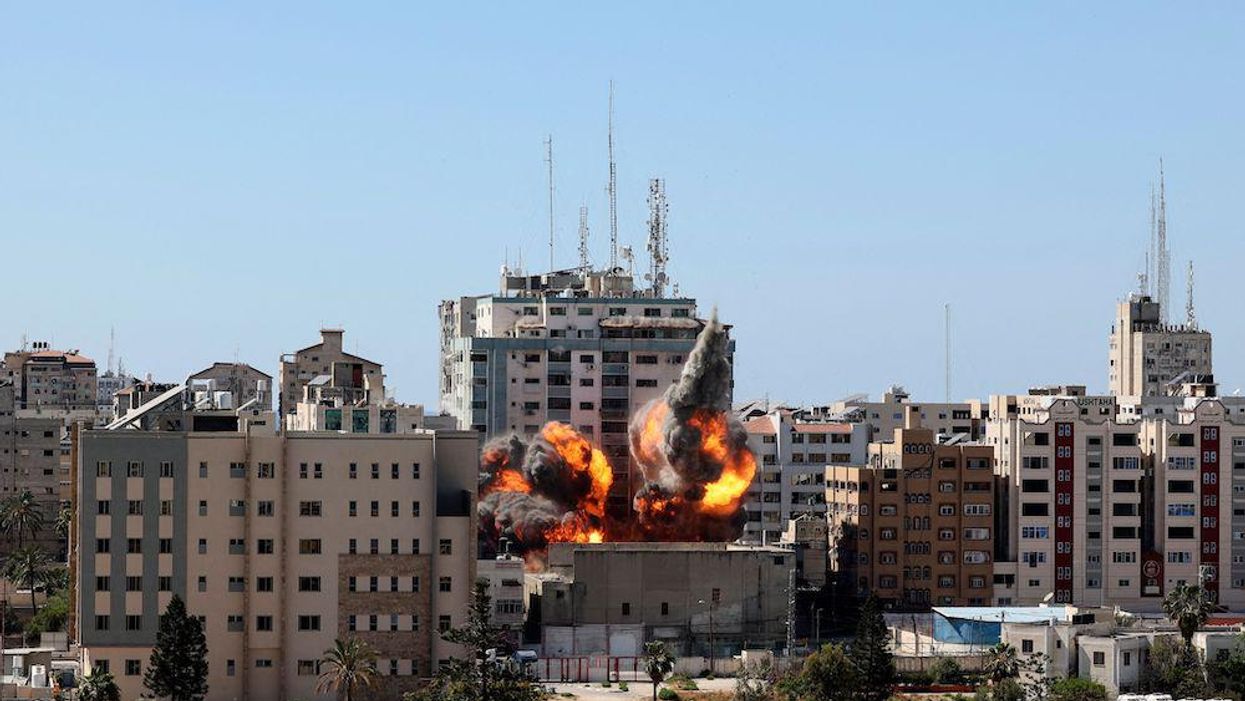
Photo by MAHMUD HAMS/AFP via Getty Images

Israeli Defense Forces took down a Gaza City building that housed multiple media outlets and personnel, including Associated Press journalists, over the weekend because, according to Israel's government, the building also housed Hamas assets and terrorists.
After the attack, the AP denied having any knowledge that Hamas was in the building, despite evidence to the contrary. Now a major U.S. newspaper wants to know why anyone should trust what the AP reports.
On Saturday, IDF forces destroyed a Gaza City high-rise that housed the AP because it was a location also known to house Hamas, the terrorist organization currently lobbing thousands of rockets into Israel. An hour before launching its strike, the Israeli military warned civilians and journalists in the building that they needed to evacuate. As a result, zero members of the media were injured.
Following the strike, the IDF said, "After providing advance warning to civilians & time to evacuate, IDF fighter jets struck a multi-story building containing Hamas military intelligence assets. The building contained civilian media offices, which Hamas hides behind and deliberately uses as human shields."
But members of the AP decried the IDF's move, saying the media agency, which had been in the building for 15 years, had no idea Hamas was also on the premises.
The AP reported on the incident as though it was unaware of Hamas' presence, saying, "The Israeli military said it targeted the building because it contained assets of Hamas intelligence agencies, which it said were using media offices as 'human shields.' It did not provide evidence for the claims."
AP President and CEO Gary Pruitt said his organization was "shocked and horrified" by the move, claiming, "The Israeli government says the building contained Hamas military intelligence assets. We have called on the Israeli government to put forward the evidence."
"AP's bureau has been in this building for 15 years. We have had no indication Hamas was in the building or active in the building," Pruitt asserted. "This is something we actively check to the best of our ability. We would never knowingly put our journalists at risk."
Israeli Prime Minister Benjamin Netanyahu countered the AP's claims Sunday, telling CBS' "Face the Nation" that the building was a "perfectly legitimate target" and that the intelligence about Hamas' location was shared with the U.S. government.
Even more damning, former AP reporter Matti Friedman reported for The Atlantic in 2014 that the AP was fully aware of Hamas' presence.
The AP staff in Gaza City would witness a rocket launch right beside their office, endangering reporters and other civilians nearby—and the AP wouldn't report it, not even in AP articles about Israeli claims that Hamas was launching rockets from residential areas. (This happened.) Hamas fighters would burst into the AP's Gaza bureau and threaten the staff—and the AP wouldn't report it. (This also happened.) Cameramen waiting outside Shifa Hospital in Gaza City would film the arrival of civilian casualties and then, at a signal from an official, turn off their cameras when wounded and dead fighters came in, helping Hamas maintain the illusion that only civilians were dying. (This too happened; the information comes from multiple sources with firsthand knowledge of these incidents.)
In response to the AP's claim of ignorance about Hamas being in their building, the New York Post asked in a staff editorial in the Tuesday issue why anyone should trust the AP's reporting.
"If it's true that AP was so unaware — and the evidence suggests it's unlikely — how can anyone trust its reporting in the region?" the Post asked.
The paper indicated that, if the AP was unable to figure it out, its reporting abilities should be called into question. If AP did know, then its willingness to cover-up and obfuscate should lead people to question the agency's ability to deliver trustworthy news.
Citing Friedman's 2014 report, the Post said, it certainly appears the AP did know about Hamas occupying the same building and refused to reveal it.
"It seems that what AP doesn't know — and doesn't report — always favors Hamas over those the group terrorizes," the Post concluded.